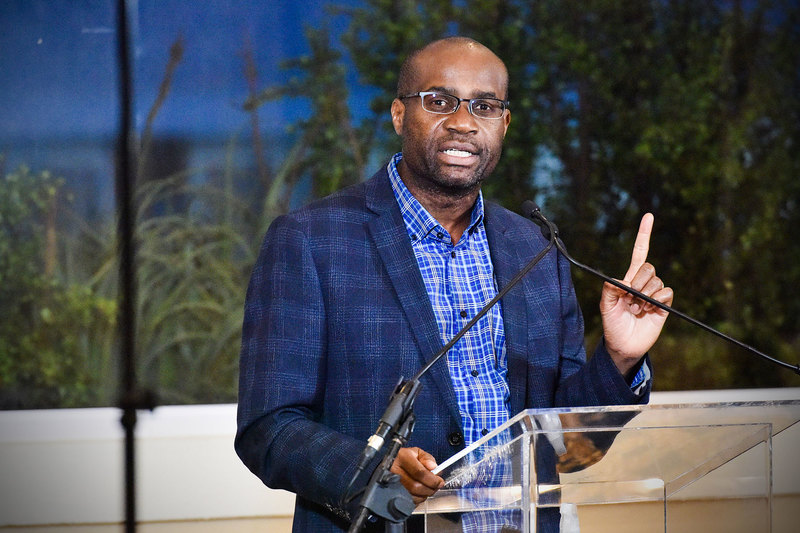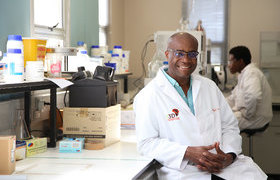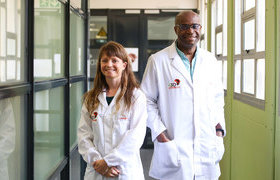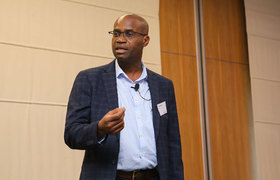Second cohort of AI2050 Senior Fellows named
20 October 2023 | Story Supplied. Photo Lerato Maduna. Read time 5 min.
On 17 October, Schmidt Futures, a philanthropic initiative of Eric and Wendy Schmidt, announced the second cohort of AI2050 Senior Fellows who will pursue bold and interdisciplinary research in artificial intelligence (AI) to help chart the development of AI for societal benefit.
Among the seven fellows announced is Professor Kelly Chibale, the Neville Isdell Chair in African-centric Drug Discovery and Development at the University of Cape Town (UCT); and the founder and director of H3D, UCT’s drug discovery and development centre based in the Department of Chemistry and the Institute of Infectious Disease and Molecular Medicine (IDM).
AI2050 is a programme that advances Eric and Wendy Schmidt’s US$125 million, five-year commitment to support talented individuals working to ensure AI’s benefit to society. AI2050 Fellows grapple with the programme’s motivating question: “It’s 2050. AI has turned out to be hugely beneficial to society. What happened? What are the most important problems we solved and the opportunities and possibilities we realised to ensure this outcome?” The 2023 Senior Fellows will join the existing community of AI2050 Fellows, including the inaugural 2022 cohort of five Senior Fellows and 15 Early-Career Fellows.
The seven 2023 Senior Fellows are leading ambitious work that will accelerate progress in AI to solve the hardest problems in their respective fields. Their work spans a broad spectrum – from revolutionising drug discovery in Africa to increasing the capacity of AI systems for cooperative and aligned behaviour, to pioneering human-centric robots capable of performing everyday household activities.
Sustainable AI solutions
Cohort members will seek sustainable AI solutions that transcend boundaries, whether by creating art installations for community engagement with AI or via integrating large language models with symbolic AI to mimic human cognition. Their collective efforts underscore the necessary work that remains in ensuring that AI serves as a catalyst for positive change.
AI2050 has allocated up to US$7 million to support the new Senior Fellows’ research to address the Hard Problems in AI in their respective fields, including computer science, chemistry, cognitive science, the arts, and philosophy. Fellows also may be eligible for additional support and opportunities as their research agenda further develops.
“This fellowship will support the H3D Foundation’s mission to unlock sustainable drug discovery in Africa in collaboration with Ersilia Open-Source Initiative (EOSI). The research to be undertaken seeks to use AI to solve the problem of suboptimal efficacy and safety of medicines used in African populations,” said Professor Chibale.
“The approach we will take involves two techniques that have not been tried before, namely: linking AI to existing modelling tools used in human dose prediction for clinical trials and boosting the development of ready-to-use AI models for drug discovery in Africa.
“The AI2050 Senior Fellowship builds on research recently published in Nature Communications from a partnership between the H3D and EOSI.”
“AI is already an irreversible part of our daily lives, from recommendation systems on our phones to tools for scientific research.”
James Manyika, the co-chair of AI2050, remarked: “AI is already an irreversible part of our daily lives, from recommendation systems on our phones to tools for scientific research. But the challenge of harnessing AI for good requires multidisciplinary work from those at the frontier of AI’s technological developments, as well as those at the frontier of analysing its impacts on society. AI will provide a net benefit for humanity if we can solve specific hard problems concerning its development, risks, opportunities, and effects.”
Eric Schmidt, the co-founder of Schmidt Futures and co-chair of AI2050, said: “AI is changing human knowledge, perception, identity, and reality. The responsible application of AI can chart this transformative technology’s development, which will deliver benefits for all, earn the public trust, and advance scientific progress.”
Mark Greaves, the executive director of AI2050, added: “AI2050 is motivated by the critical question of how humanity can realise the most beneficial aspects of AI, while simultaneously mitigating its potentially harmful and destabilising effects. I eagerly welcome our new Senior Fellows into the AI2050 community and look forward to watching them change the world.”
The 2023 AI2050 Senior Fellows are:
- Anima Anandkumar, California Institute of Technology
- Fei-Fei Li, Stanford University
- Gillian Hadfield, University of Toronto
- Kelly Chibale, University of Cape Town
- Josh Tenenbaum, Massachusetts Institute of Technology
- Stephanie Dinkins, Stony Brook University
- Tobias Rees, Limn
Read more about Schmidt Futures.
 This work is licensed under a Creative Commons Attribution-NoDerivatives 4.0 International License.
This work is licensed under a Creative Commons Attribution-NoDerivatives 4.0 International License.
Please view the republishing articles page for more information.










